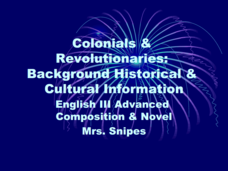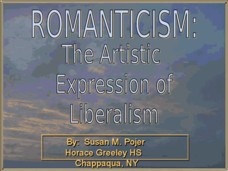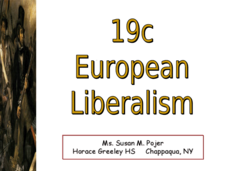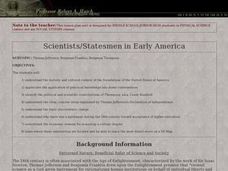iCivics
Why Government?
Why do people create governments? Where did we get our ideas about government? This is a fantastic introductory lesson for your American government class that begins by reviewing the philosophies of Thomas Hobbes and John Locke in...
Curated OER
Unit 12: Enlightenment and French Revolution
For this Enlightenment lesson, students respond to 34 short answer questions about John Locke, Thomas Hobbes, Baron de Montesquieu, Jean Jacques Rousseau, Voltaire, Denis Diderot, and Mary Wollstonecraft.
Curated OER
Colonials & Revolutionaries: Background Historical & Cultural Information
The four major trends of the 18th century (The Enlightenment, the Great Awakening, British global ambitions, and economic disagreements) are the focus of a PowerPoint that places in context such influences as deism, mercantilism,...
Curated OER
Revolutions in Latin America (19c - Early 20c)
The history of the Latin American revolutions - and the philosophies behind them - is the focus of this comprehensive presentation. From the theories of the European Enlightenment, to the Revolutionary Wars of America and France, Latin...
Curated OER
Romanticism: The Artistic Expression of Liberalism
The epic clash of reason and emotion comes to life in this informative presentation. Detailing the period of Romanticism in 19th century Europe, these slides contain pictures of the most famous pieces of art during this period. Viewers...
Curated OER
Locke v. Hobbes
In this Hobbes and Locke study guide worksheet, students respond to 18 short answer questions. The questions correlate to assigned readings in a textbook.
Curated OER
19c European Liberalism
If you'd like to prompt some great discussions in your history class, this presentation will surely get your class talking. Addressing 19th century liberalism in Europe (including influences from England, France, America, and Ireland),...
Curated OER
People Change the Landscape
Learners examine ways in which humans have brought change to the natural environment. In this ecology and literacy activity, students listen to the book Island Boy by Barbara Cooney. Learners observe and define map-reading vocabulary as...
Curated OER
Locke's Second Treatise on Civil Government
In this online interactive history worksheet, students respond to 10 short answer and essay questions about Locke's Second Treatise on Civil Government.
Curated OER
Teaching "Theme" with Children's Literature
In this exercise, learners examine the difference between a theme, topic, and moral. After a class discussion on the definition of literary themes, the instructor reads The Cello of Mr. O by Jane Cutler. Next, individuals analyze the...
Curated OER
Technology: Creating Introductions with Digital Cameras
Third graders discover how to use digital video cameras to record introductions of themselves for Powerpoint presentations. They decide what to say, which points to highlight, and how to interest viewers. Their Powerpoint presentations...
Curated OER
American Transcendentalism and Buddhism:
High schoolers study American transcendentalism through readings of Emerson and Thoreau. They make cognitive connections to the similarities to Buddhism in these writings. The connection of the literary movement is explained in the art...
Curated OER
The Four Religions of East Asia
Students compare and contrast the four main religions of Asia (Buddhism
Confucianism, Daoism, and Shinto). This lesson is intended for use in the middle school Social Studies classroom.
Curated OER
Scientists and Statesmen in Early America
Explore the historic and cultural context of the foundations of the United States of America. They identify the political and scientific contributions of early American scientists.
Other
Secular Humanism: Thomas Paine
The Secular Humanism site looks at Thomas Paine and his political philosophy based in deist thought.
iCivics
I Civics: The Enlightenment Mini Lesson
The Enlightenment was a period of time, starting around 1715, when people developed new ideas about human existence, including people's basic rights and the purpose of government. When our Founding Fathers created a government for the...
















